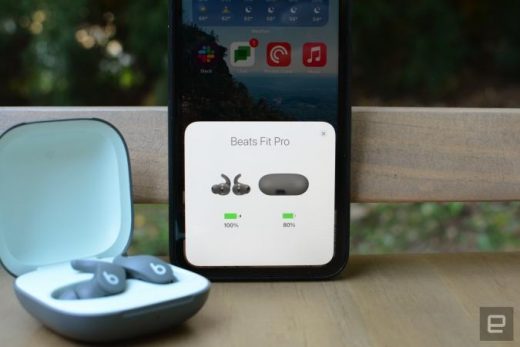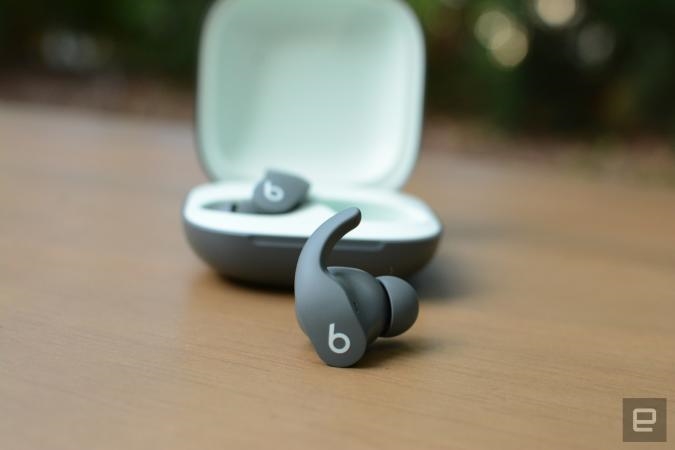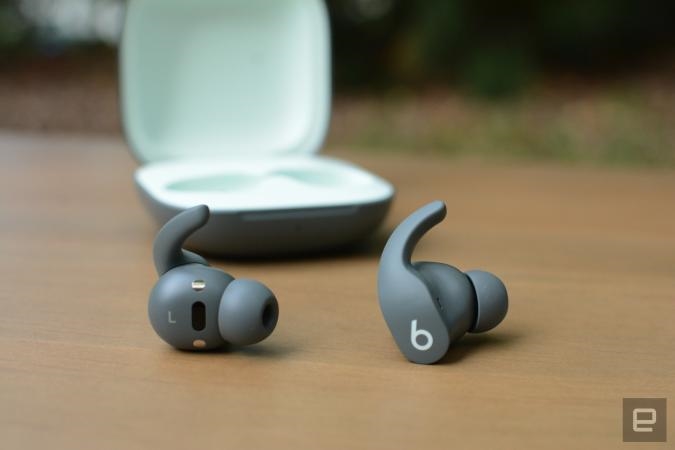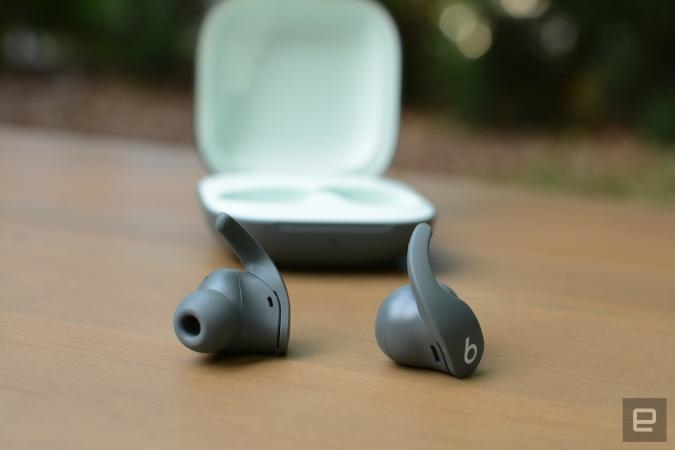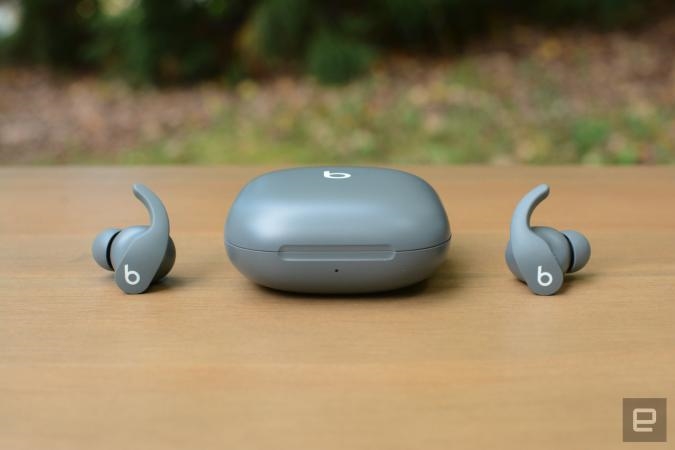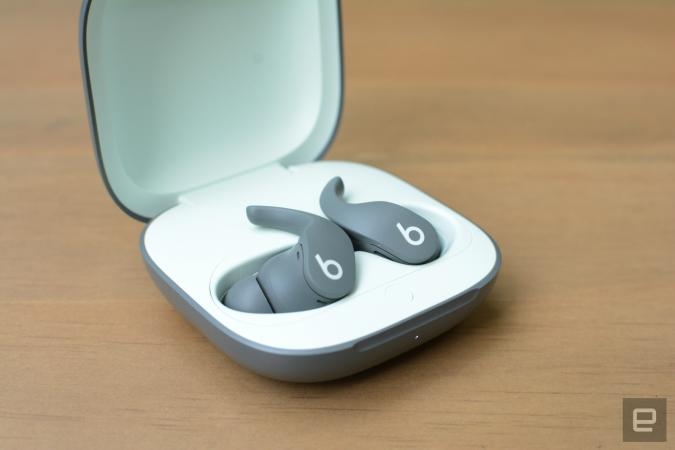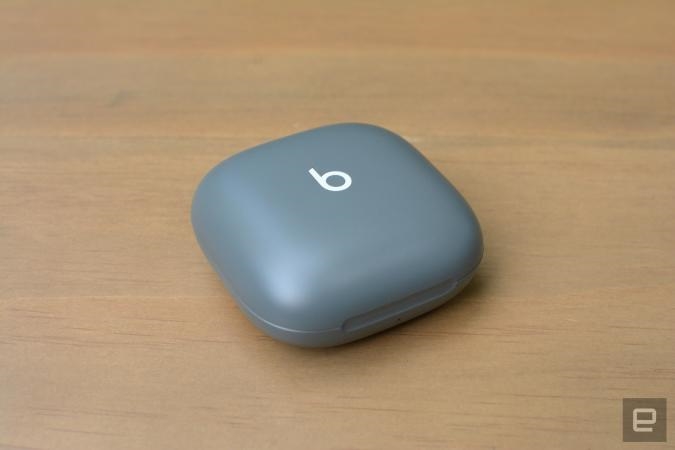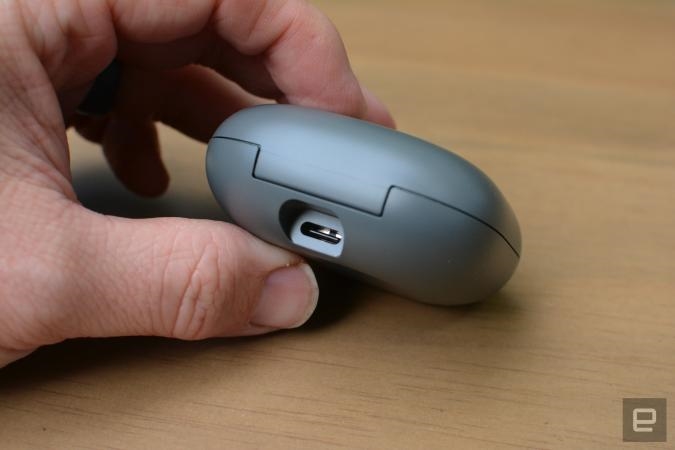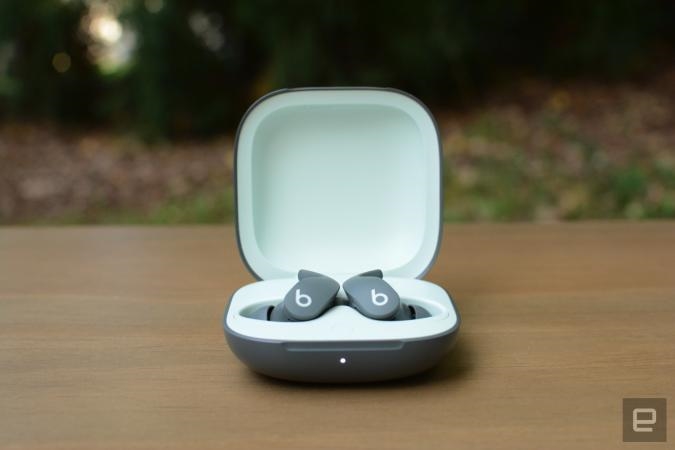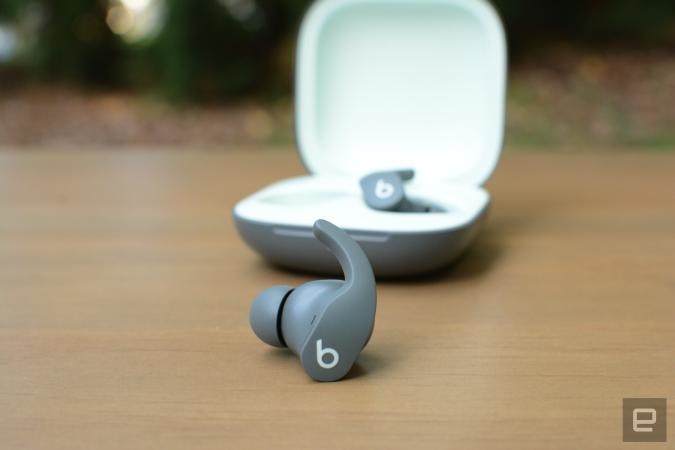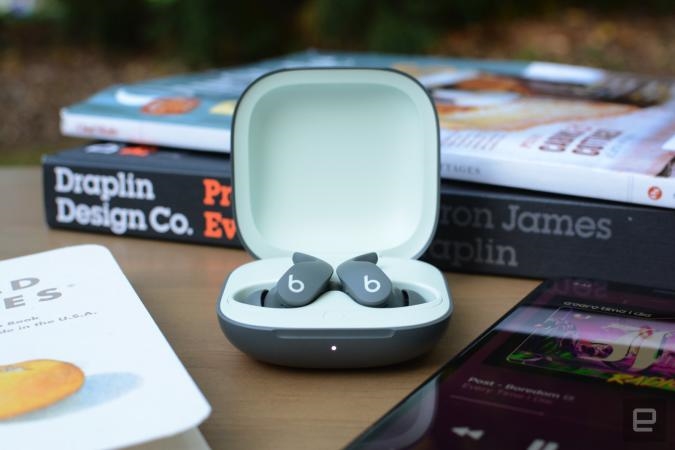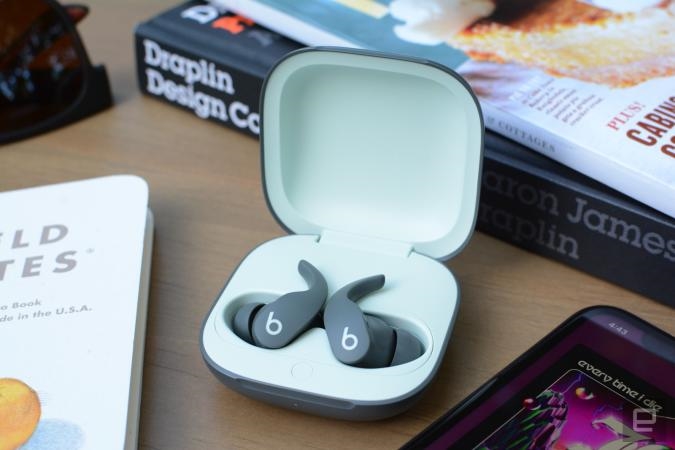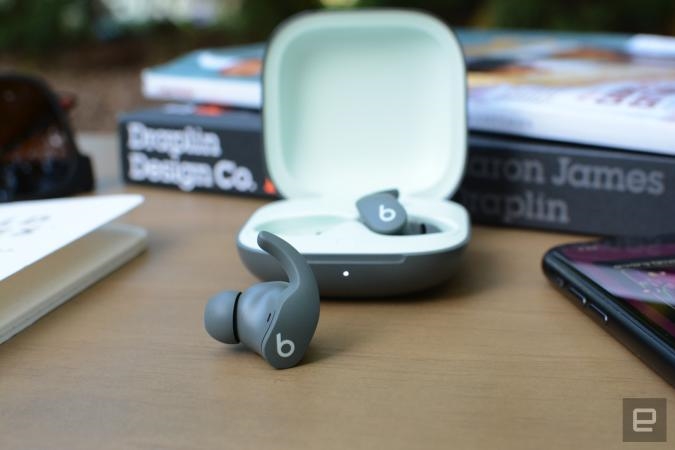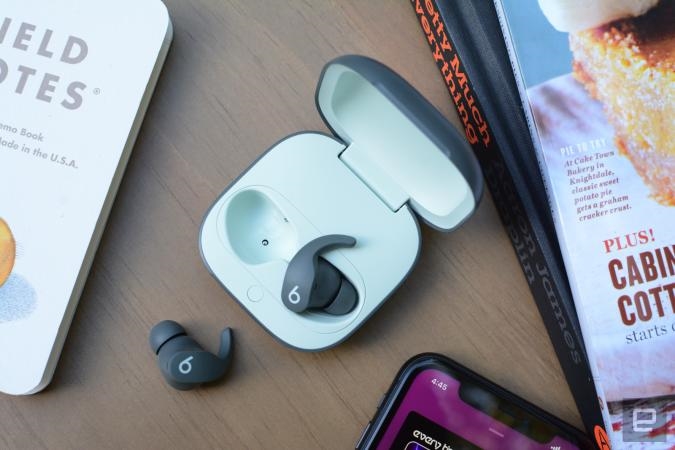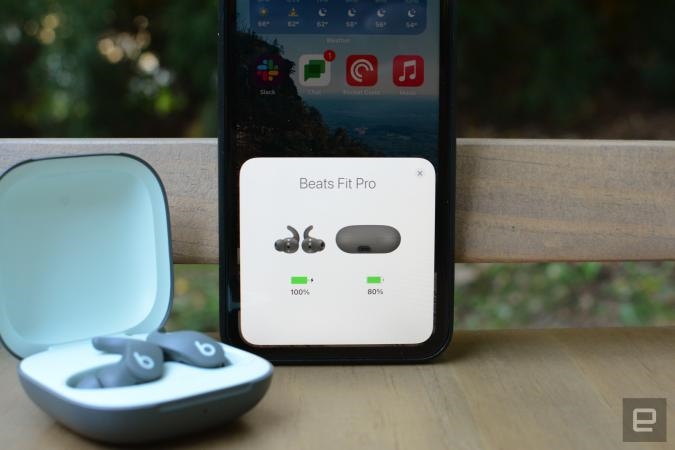ICYMI: The Beats Fit Pro are an intriguing AirPods Pro alternative
Beats Fit Pro review: All the perks of AirPods with a more comfortable design
A more traditional fit combined with ANC, Adaptive EQ and spatial audio.

Thanks to some early hints in iOS 15.1, Beats’ latest earbuds are hardly a surprise. Today the company officially debuted its latest model: the $200 Beats Fit Pro. With a similar design to the Studio Buds that arrived earlier this year, this new pair offers active noise cancellation (ANC) alongside almost all of the features from Apple’s third-generation AirPods. That includes hands-free Siri, Adaptive EQ, spatial audio and more. Beats has also added a wing for a more secure fit during workouts and kept the IPX4 rating from the Studio Buds. All of those features, combined with a more attractive design, gives the company an alternative to the Powerbeats Pro in its lineup.
Design
If you’re thinking the Beats Fit Pro look almost exactly like the Beats Studio Buds, you’re not wrong. This new model is a smidge larger and the angle of the tab that holds the on-board controls is slightly different. The overall aesthetic and shape are pretty much identical, though. The biggest design difference is the fit wing, or wingtip as Beats calls it. Unlike a lot of sporty earbuds, this element is very flexible so it can bend to fit a greater range of ear shapes. That also makes it more comfortable. Even though the wing is helping keep the buds in place, you hardly know it’s there.
Fit Pro
Pros
- Loads of handy features
- Comfy fit
- Solid ANC performance Balanced punchy bass
Cons
- Accidental button presses are a thing
- No wireless charging
- Some features are iOS exclusive
- Volume controls require sacrifice
Like the Studio Buds, the on-board controls for the Beats Fit Pro are on the lowercase ‘b’ logo on the outside of each earbud. They’re still physical buttons you have to press rather than touch controls built for tapping. Controls are mirrored on each side by default, with options for play/pause and answering calls (single press) in addition to skipping tracks (twice for forward, three times for back) and cycling between ANC on and transparency mode (long press). The long press can be reconfigured for volume control, allowing you to turn it up on one side and down on the other. If you do this, you lose the ability to access noise cancellation or ambient sound mode. Bummer.
Beats says it strategically positioned the button for the on-board controls at the bottom of the hump on each earbud “to avoid accidental presses.” Just like I encountered on the Studio Buds, I frequently activated the controls when trying to adjust the fit of the earbuds. With the wingtip I had to do this less often than the previous model, but it was still annoying to want to secure the buds in my ear only to errantly pause the audio or change the noise control mode. And due to the positioning of the microphones, any fit adjustment usually meant touching the external mics and creating extra noise.
Apple’s new wear detection sensor sits around back. Like the tech on the new AirPods, the Beats Fit Pro have an optical sensor outfitted with wavelength LEDs that can determine if an object is skin in addition to proximity. Both Apple and Beats explain that this makes the automatic pausing more accurate, avoiding accidental activation when you don’t actually have them in your ear. Of course, this also helps save battery life when you’re less likely to erroneously turn them on.
Software and features
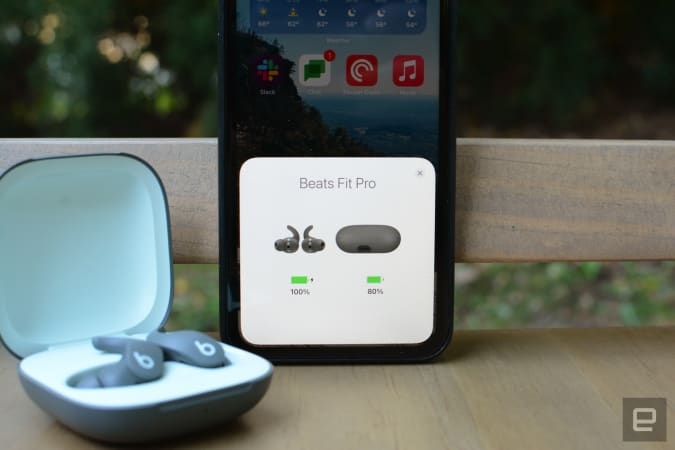
Thanks to Apple’s H1 chip, the Beats Fit Pro have a lot of the same features as the new AirPods. Those include one-touch pairing, where even the first time you open the case, all you have to do is tap a pop-up on your iPhone and the earbuds are connected. Messing with a Bluetooth menu and putting a device in pairing mode are both relics of a bygone era. H1 also powers hands-free Siri and Apple’s enhanced Find My features. Lastly, you get Audio Sharing too, so you can listen to music or watch a movie with someone who has a set of earbuds or headphones made by Apple or Beats.
In terms of software, everything you need for Beats Fit Pro is built into iOS 15 for iPhone users. From Control Center, you can easily access noise control and spatial audio settings with a long press on the volume slider. You can reassign the press-and-hold on-board control from the ‘i’ icon next to the device name in the Bluetooth menu. An ear tip fit test resides there too, just like it does for the AirPods Pro, and you can disable automatic ear detection as well. Noise and spatial audio controls are located on this menu too if you’d prefer to access them here. On Android devices, Beats has a dedicated app that handles fast pairing and includes the ear tip fit test, control customization and battery status features available on iOS.
Sound quality
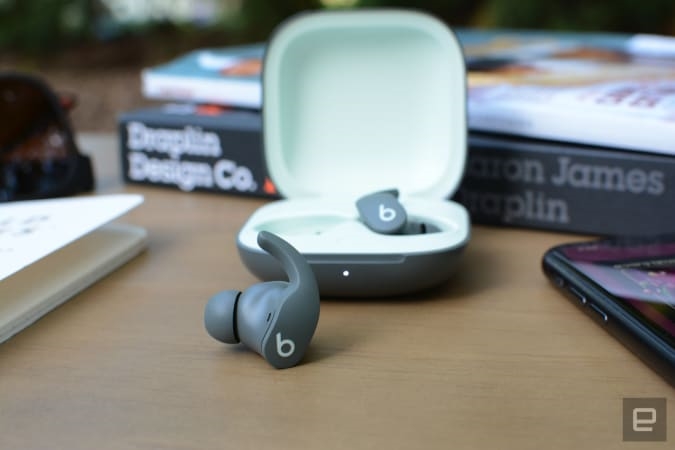
Beats says it completely redesigned its proprietary transducer for the Fit Pro, creating “an entirely custom acoustic architecture” and promising balanced and powerful sound. That last bit is immediately apparent the first time you fire up these earbuds. There’s much more low-end tone on this model than what the Studio Buds offer. The punchier bass establishes more depth as well, so there’s more room for vocals, instruments and other elements to come through without sounding compressed or boring.
Indeed, guitars ring out in the chaotic metal of Every Time I Die, with bombastic drums booming underneath. The bass is ample and never overpowers, even with genres where things can get out of hand quickly when the tuning is the slightest bit off. There’s a clarity on the Fit Pro that’s well suited for genres like blues, bluegrass, ambient, electronic and more. Across all of those genres, the crisp details highlight Beats’ full range of tones. Bass, fiddle, guitar and mandolin all stand on their own for acts like Nickel Creek, giving space for each to shine. There’s no doubt the sound profile here is an improvement over the Studio Buds, but it’s not on the level of pricer sets like the MW08, Momentum True Wireless 2 or WF-1000XM4.
Thanks to the H1 chip, Beats Fit Pro work with Apple’s spatial audio. This gives you the ability to listen to Dolby Atmos Music content in Apple Music — with or without dynamic head tracking enabled. Spatial audio is also available for these earbuds on Apple TV or movies and TV shows streamed iPhone or iPad. Like the latest AirPods, the Fit Pro are equipped with Apple’s Adaptive EQ. This feature is active when you disable both ANC and transparency mode, continuously monitoring sound with internal microphones and adjusting the low- and mid-range frequencies to keep the audio quality consistent. The feature also takes into account the shape of your ear when making its tweaks.
Gallery: Beats Fit Pro review
As I’ve already mentioned, the Beats Fit Pro have active noise cancellation on board. It’s another feature powered by Apple’s H1 chip and it, too, adapts to both ambient noise and how the earbuds fit in your ears. Like previous Beats headphones, this tech continuously monitors and automatically adjusts based on the environmental clamor. Beats says the system is powered by an algorithm that can adapt the signal 200 times per second. That looks nice on paper, but at the end of the day, all you need to know is the ANC system on the Fit Pro does a solid job of blocking distractions when you need it to. It’s not as powerful as Bose or Sony, but it counters distractions well enough to come in handy.
As is typically the case with noise-cancelling earbuds these days, the Fit Pro also offer a transparency mode for tuning into your surroundings. There’s no denying this tool is helpful in certain scenarios when you need to pay some attention to what’s going on around you. However, like the Studio Buds, these don’t feed your voice back into the earbuds when you talk, so you have to speak up to hear yourself. Still, transparency mode will help you keep an ear out for your name at a coffee shop.
Call quality
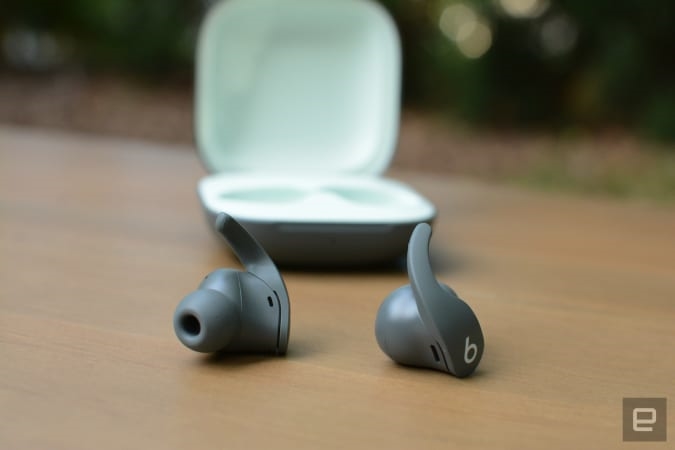
For calls, Beats equipped the Fit Pro with six microphones: three on each side. External beamforming mics focus on your voice while the internal units for ANC, transparency mode and Adaptive EQ pull double duty to help improve calls. The company says the feed-forward microphones are recessed to avoid wind issues and a voice accelerometer counters external noise with the help of “an advanced algorithm.”
All earbud companies make some version of this pitch with a mix of mics, algorithms and strategic placement. Mileage varies greatly with these promises and more often than not they don’t hold up. With the Fit Pro, your voice sounds better than speakerphone, but it comes across muffled on the other end. The person you’re speaking to will also get ample background noise if it’s loud enough. At the end of the day, these will work fine if you’re in a decently quiet space, but don’t expect them to block out a noisy office when you have a phone or video call.
When they first arrive, the Beats Fit Pro won’t support Apple’s new Group FaceTime spatial audio. The feature employs immersive sound so that participants sound like they’re speaking from the location they are on your screen. Apple says this makes FaceTime calls more natural, and it does to a degree. It definitely enhances the experience of a meeting or group chat, but it’s still far from real life. Beats says it plans to add this feature to the Fit Pro as part of a future software update.
Battery life
Beats is promising up to six hours of use on the earbuds with ANC or transparency mode active. When you factor in the additional 21 hours in the case, that’s 27 hours of listening time with the most attractive features turned on. If you opt to skip those and go with Adaptive EQ mode, you can expect an extra hour on the Beats Fit Pro and three more in the case for a total of 30. As always, the company has included its Fast Fuel feature that offers an hour of noise-cancelling playback with a five-minute charge.
Battery life claims are rarely an issue with Beats gear and that holds true here. Using a mix of active noise cancellation and transparency mode throughout the day, I managed nearly seven hours before completely depleting the power. I missed it by about 10 minutes. That’s enough to get you through a full day at the office, and if you can dock the buds at some point, you’ll have no trouble wearing them during your commute either. All of these figures are on par with the new AirPods, but Apple’s latest don’t have ANC. Our current top pick for best earbuds, Sony’s WF-1000XM4, lasted seven and a half hours during my tests with noise cancellation active.
The competition
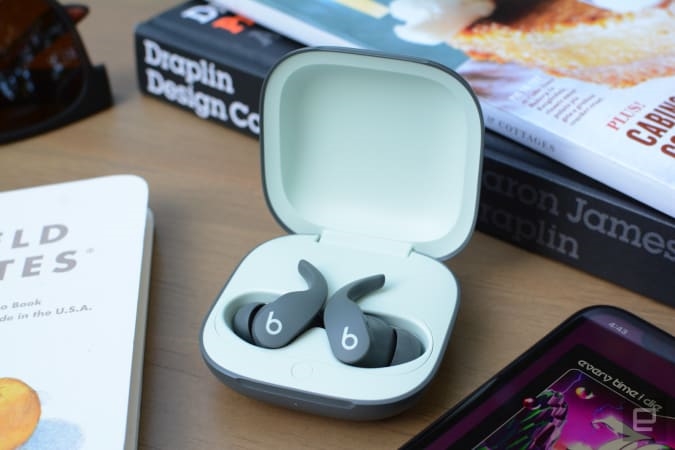
Beats has a more affordable alternative to the Fit Pro in its lineup. The Studio Buds will save you $50, but you’ll have to make some sacrifices. First, and perhaps most importantly, the sound quality isn’t nearly as good. It lacks the punchy bass and overall depth the Fit Pro exhibits. The Studio Buds don’t have Apple’s H1 chip, but you still get quick pairing and hands-free Siri in addition to the ability to listen to Dolby Atmos tunes in Apple Music. What you won’t find is Adaptive EQ or the new skin-activated wear detection sensor.
The absolute best true wireless earbuds you can buy right now are still the Sony WF-1000XM4. As feature-packed as the Fit Pro are, the handy features are most useful for iOS. Sony goes beyond ANC to include automatic pausing when you speak and quick attention mode for short conversations. You can also fully automate your noise-cancelling or transparency levels on the WF-1000XM4 based on your activity or location. Of course, that’s if you’re willing to trade some privacy for convenience.
Wrap-up
If you’re looking for the best of what AirPods has to offer in earbuds that don’t have the polarizing stick apparatus, the Beats Fit Pro should do the trick. They offer a nice blend of features, sound and noise-cancelling performance for the price. Sure, there are better options but they also cost significantly more, especially if you’re looking for the absolute best audio quality. For now, Beats is giving the masses an AirPods alternative that’s actually still packed with Apple tech. And that’s an interesting proposition for iPhone owners.
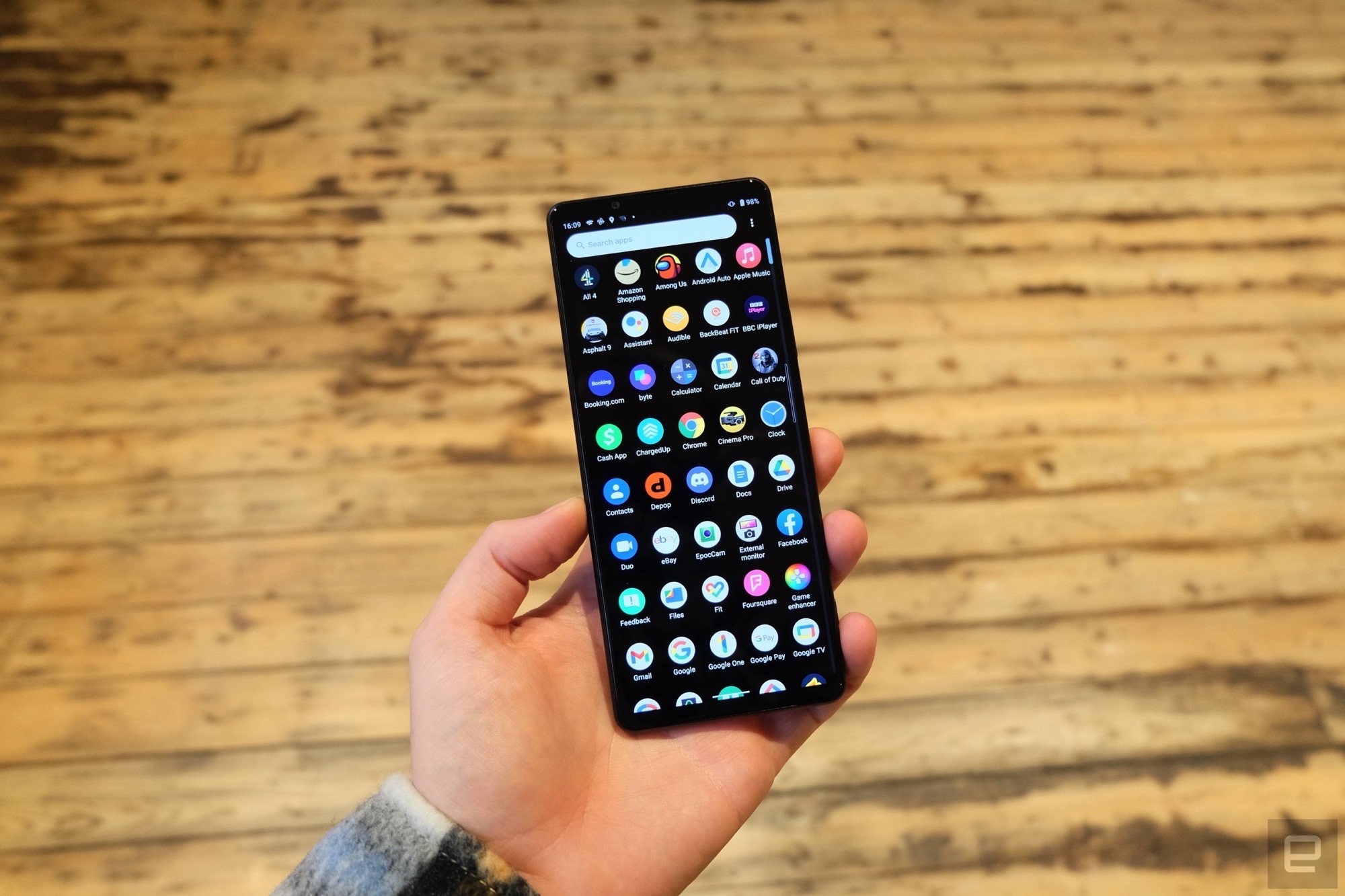
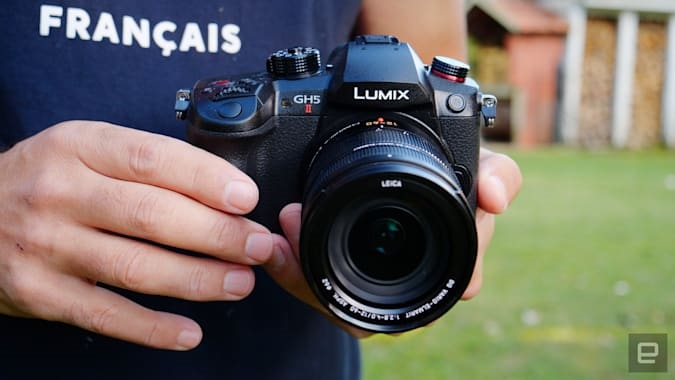

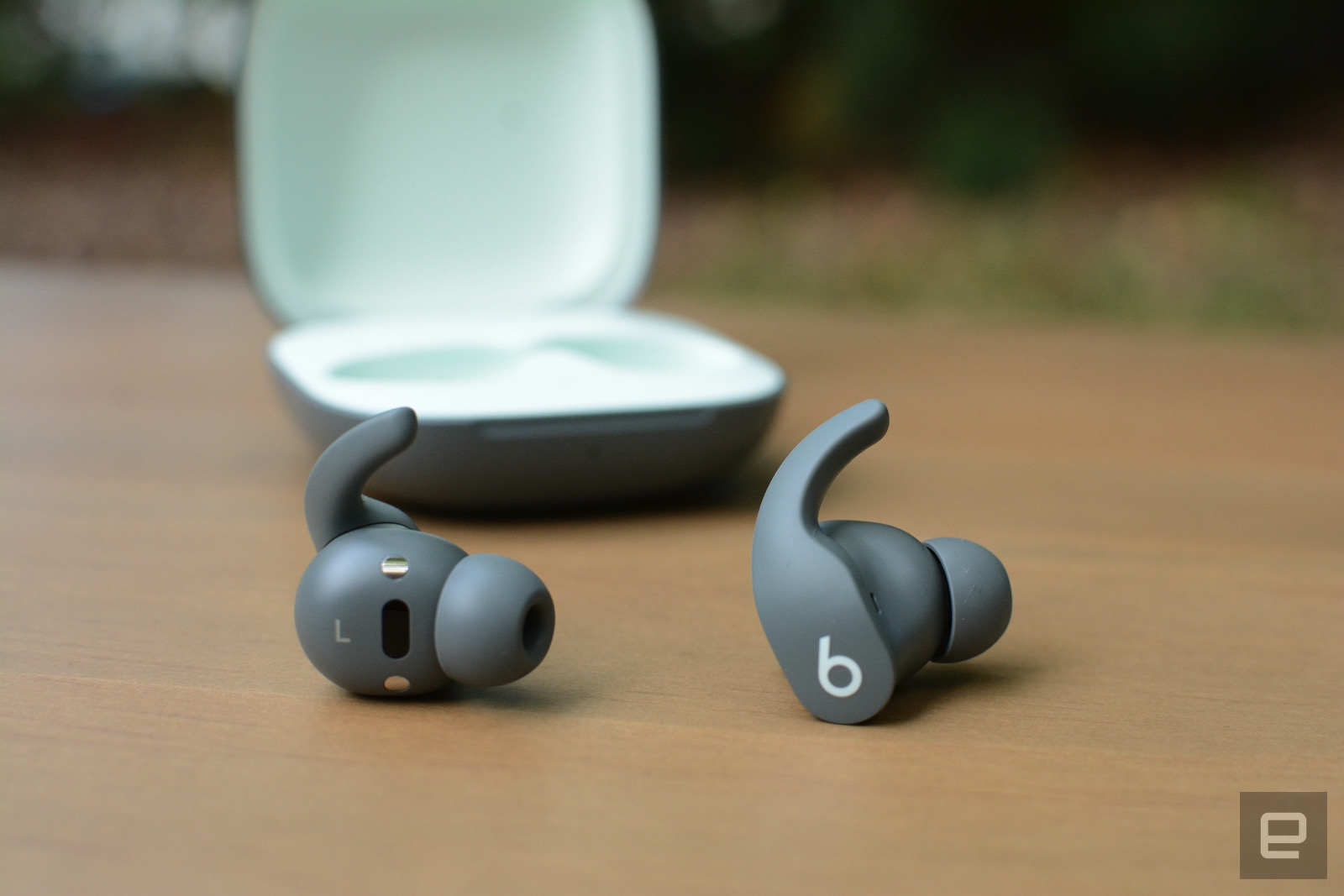
(54)

